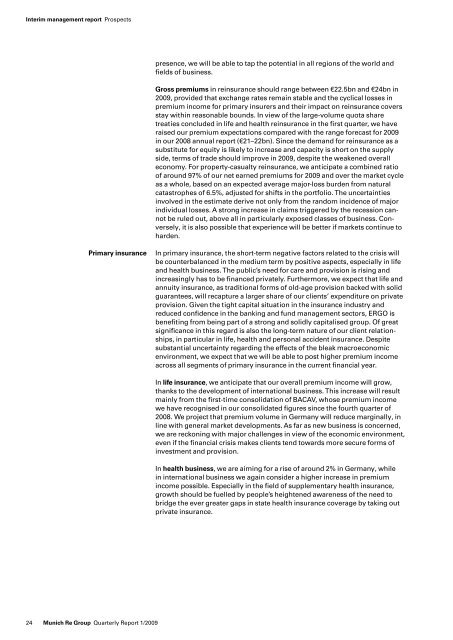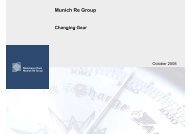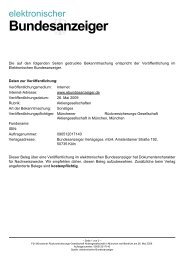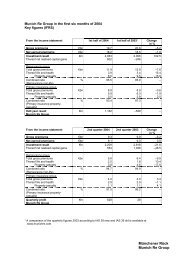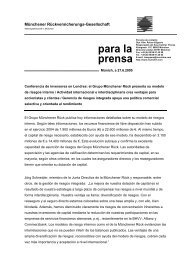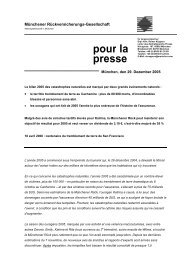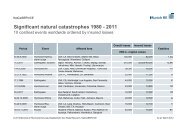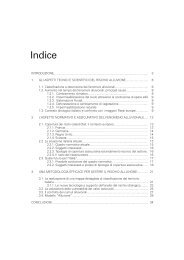Quarterly Report 1/2009 - Munich Re Group
Quarterly Report 1/2009 - Munich Re Group
Quarterly Report 1/2009 - Munich Re Group
Create successful ePaper yourself
Turn your PDF publications into a flip-book with our unique Google optimized e-Paper software.
Interim management report Prospects<br />
24 <strong>Munich</strong> <strong>Re</strong> <strong>Group</strong> <strong>Quarterly</strong> <strong><strong>Re</strong>port</strong> 1/<strong>2009</strong><br />
presence, we will be able to tap the potential in all regions of the world and<br />
fields of business.<br />
Gross premiums in reinsurance should range between €22.5bn and €24bn in<br />
<strong>2009</strong>, provided that exchange rates remain stable and the cyclical losses in<br />
premium income for primary insurers and their impact on reinsurance covers<br />
stay within reasonable bounds. In view of the large-volume quota share<br />
treaties concluded in life and health reinsurance in the first quarter, we have<br />
raised our premium expectations compared with the range forecast for <strong>2009</strong><br />
in our 2008 annual report (€21–22bn). Since the demand for reinsurance as a<br />
substitute for equity is likely to increase and capacity is short on the supply<br />
side, terms of trade should improve in <strong>2009</strong>, despite the weakened overall<br />
economy. For property-casualty reinsurance, we anticipate a combined ratio<br />
of around 97% of our net earned premiums for <strong>2009</strong> and over the market cycle<br />
as a whole, based on an expected average major-loss burden from natural<br />
catastrophes of 6.5%, adjusted for shifts in the portfolio. The uncertainties<br />
involved in the estimate derive not only from the random incidence of major<br />
individual losses. A strong increase in claims triggered by the recession cannot<br />
be ruled out, above all in particularly exposed classes of business. Conversely,<br />
it is also possible that experience will be better if markets continue to<br />
harden.<br />
Primary insurance In primary insurance, the short-term negative factors related to the crisis will<br />
be counterbalanced in the medium term by positive aspects, especially in life<br />
and health business. The public’s need for care and provision is rising and<br />
increasingly has to be financed privately. Furthermore, we expect that life and<br />
annuity insurance, as traditional forms of old-age provision backed with solid<br />
guarantees, will recapture a larger share of our clients’ expenditure on private<br />
provision. Given the tight capital situation in the insurance industry and<br />
reduced confidence in the banking and fund management sectors, ERGO is<br />
benefiting from being part of a strong and solidly capitalised group. Of great<br />
significance in this regard is also the long-term nature of our client relationships,<br />
in particular in life, health and personal accident insurance. Despite<br />
substantial uncertainty regarding the effects of the bleak macroeconomic<br />
environment, we expect that we will be able to post higher premium income<br />
across all segments of primary insurance in the current financial year.<br />
In life insurance, we anticipate that our overall premium income will grow,<br />
thanks to the development of international business. This increase will result<br />
mainly from the first-time consolidation of BACAV, whose premium income<br />
we have recognised in our consolidated figures since the fourth quarter of<br />
2008. We project that premium volume in Germany will reduce marginally, in<br />
line with general market developments. As far as new business is concerned,<br />
we are reckoning with major challenges in view of the economic environment,<br />
even if the financial crisis makes clients tend towards more secure forms of<br />
investment and provision.<br />
In health business, we are aiming for a rise of around 2% in Germany, while<br />
in international business we again consider a higher increase in premium<br />
income possible. Especially in the field of supplementary health insurance,<br />
growth should be fuelled by people’s heightened awareness of the need to<br />
bridge the ever greater gaps in state health insurance coverage by taking out<br />
private insurance.


